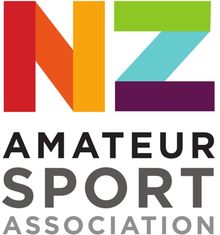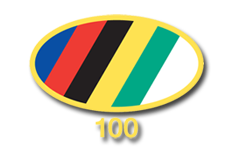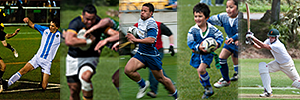I Played the Lions: Brian Coulter (1966)

Brian Coulter shifted to Wellington in 1964 to work for the Government in accounting. It was a job that lasted less than three months.
Fortunately, the old boy of St. Kevin's College, Oamaru, made a greater initial impression in rugby. The former Canterbury halfback was the top ranked nine in the capital by the end of the season.
“There was a lot of competition in those days. I guess I was lucky guys like Paul Tindall and Barry Cull pushed me to greater heights.” Coulter reflects.
Cull from Athletic played 60 games for Wellington and later became a sports commentator in Taumarunui. Paul Tindall was the son of All Black and New Zealand cricket representative Eric Tindall.
In 1965, Wellington enjoyed a vintage season winning 15 out of 19 games, famously toppling the Springboks 23-6.
Coach Bill Freeman famously plastered the Wellington dressing rooms with banners reading 'tackle' on them.
"Few people gave us a chance of beating the Springboks in 65, but we tackled ourselves to a standstill that day. Physically the game was more demanding than the Lions in 66." Coulter explains.
Wellington was the Lions fifth fixture of the 1966 visit. The tourists had already suffered defeats to Southland (8-14) and Otago (9-17).
Wellington was stacked with six All Blacks, four in the pack. Ken Gray is widely regarded as the greatest All Black prop. Lock Nev MacEwan played 10 tests alongside Colin Meads. Flanker Graham Williams still holds the record for most games for Wellington with 174 while Tom Lister from South Canterbury was capped eight times for his country and would be the inaugural club rugby Billy Wallace Best and Fairest winner this year.
Out wide fullback Mick Williment had a prodigious boot scoring 1255 points in 171 first class games and first-five Gerald Kember would became an All Black in 1970.
"We were pretty confident we could win. We had a strong team and the 66 Lions weren't in the same class as the Springboks." Coulter asserts.
“Our game plan was to play territory and take them up front. Bill Freeman was a great coach. There was real clarity about what to do.” Coulter continued.
A street parade 24-hours before kick-off helped generate hype and excitement for the 45,000 fans that flocked to Athletic Park on Saturday, June 25.

The match played in clear conditions started dramatically when Williment landed a 57-yard penalty. The Evening Post captured the hosts early intent:
“The basic attacking policy of Wellington was obvious with the pack driving through with intimate cohesion, bursting straight up midfield and using halfback Coulter as the key man to knit together the breakdown and start subsidiary fronts with finely judged kicks into the box.”
Williment doubled Wellington’s advantage in the 14th minute with a 35-yard penalty, but his next attempt from nearly 70-yards smashed into the posts sparking a Lions attacking surge.
In the 20th minute Welsh wing Dewi Bebb scored the first try from a scrappy lineout to make it 6-3. Bebb was capped 34 times and was a teacher and sports commentator who passed in 1996.
There was little Bebb could teach the Lions about forward play. Both sides traded penalties to make it 9-6, before Wellington assumed full control before the interval.
Williment missed two shots at goal and second-five Alan Osborne came into his own. In the 27th minute Osborne scored a try following good “chain passing” and was then cut down narrowly short five minutes later following an incision by New Zealand Maori representative Pat Myers.
The halftime score was 12-6 to Wellington. Coulter singled out Ken Gray for praise.
“Gray was absolutely superb. He was 16-stone which in those days was a giant of a man. He was strong and highly intelligent.”
The difference between today’s game and 1966 is best illustrated by the scrum, lineout and penalty counts. There were 59 lineouts, 27 scrums and 24 penalties allowing Coulter to control a stop-start affair. The Evening Post marvelled:
“Halfback Coulter was the masterly tactician we have grown to know, and his finely judged kicks never failed to have the Lions desperately defending.”
The second-half was scoreless for 24 minutes until Kember broke and engineered a try for Onslow centre Bruce Hill who showed “startling acceleration” to escape the Lions grasp.
The final try was scored by Williams in the 70th minute after the Lions were overpowered in a scrum. The 20-6 victory for Wellington remains their only success against the Lions.
The 1966 Lions weren’t a formidable team. They were trounced 4-0 in the test series by the All Blacks, but nine of the personnel who faced Wellington fronted in the first test.
Wellington lost their next game to Canterbury and was held to a 0-0 draw by Waikato, but otherwise swept all else before them in 1966 finishing the season with a record 19 wins from 22 games. Remarkably Wellington used 67 players, 27 of whom were debutants.
Five players have passed away from the Lion tamers. Gray after 125 games for Wellington and 24 tests for the All Blacks passed tragically in 1992. He was followed by Williment in 1994 and Osborne, after a long career as manager of DB Breweries, in 1999.
Flanker and prop Junior Finn shifted to Australia and represented Western Australia against the All Blacks in 1974. He had three All Black trials and passed aged 65 in 2008.
Lock Paul Delaney played exactly 100 first class games and was the last to perish aged 73 in 2012.
The other surviving members of the team are wing Gary Catley, son of All Black and Waikato legend Has Catley. Gary had an All Black trial in 1966 and appeared 51 times for the Mooloos.
Hooker Ken Grant played 60 games for Wellington and represented New Zealand Universities while No.8 Gary Hermansson played 50 games for Wellington and later became a prominent sports psychologist with New Zealand Olympic and Commonwealth Games teams.
In 2005 the Lions played Wellington at the Westpac Stadium and won 23-6. All the surviving members of the 1966 Wellington squad attended a reunion at the match.
Coulter played 44 games for Wellington and had All Black trials in 1965 and 1966. He later became a hugely influential figure at the Marist St. Pats club. He coached the original premier team in 1971 and was again at the helm between 1976 and 1980 guiding the 'Reds' to a record 42 wins in a row and two Jubilee Cup triumphs. He served on the boards of Wellington and New Zealand Rugby.
Coulter was an accountant for IBM for several decades. The job saw him travel the world and coach rugby in Australia, Hong Kong and Thailand.
Brain’s son Jeremy Coulter played for Wellington and North Harbour.
Brian was awarded a Queens Service Medal in 2012 for his services to rugby.
Steven White, 19 Mar 2019
Adam Julian, 19 Mar 2019
Steven White, 12 Mar 2019
Adam Julian, 04 Mar 2019
Steven White, 12 Feb 2019








.jpg)





